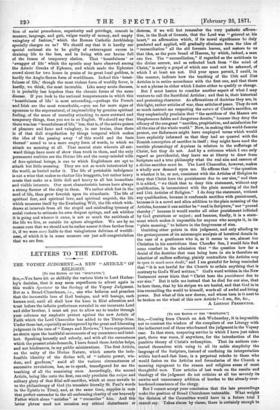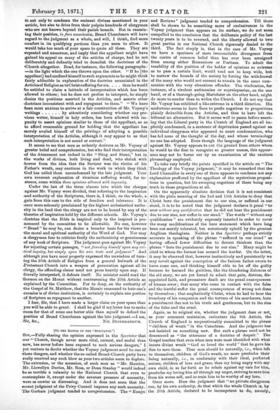[TO THE EDITOR OF THE "SPECTATOR."]
SIR,—Coming from Church on Ash Wednesday, it is impossible not to contrast the wisdom of the compilers of our Liturgy with the indiscreet zeal of those who framed the judgment in the Voysey case. In that stern, unsparing service in which I have just taken part, there was room, if anywhere, for the introduction of the punitive theory of Christ's redemption. That its authors con- tented themselves with using in all its noble simplicity the language of the Scripture, instead of confining its interpretation within hard-and-fast lines, is a perpetual rebuke to those who would fasten on the Articles and formularies of the Church a meaning repugnant to the reason and religious sense of most thoughtful men. Your articles of last week on the results and theology of the judgment do not criticize at all too severely its unwise and unnecessary addition of burden to the already over- burdened conscience of the clergy.
But I cannot accept your conclusion that the late proceedings make the position of Broad Churchmen untenable. What weight the decision of the Committee would have in a future trial I cannot say. Taken clause by clause, there is certainly enough in
lib not only to condemn the eminent divines mentioned in your article, but also to drive from their pulpits hundreds of clergymen who are not known beyond their parish bounds. But in examin- ing their position, in foro conscientite, Broad Churchmen will have regard to the judgment as a whole, and will, I think, find more .comfort in its qualifying portions than you seem to allow. It -would take too much of your space to quote all these. They are ,repeated and numerous, and imply that the appellant might have 'gained his appeal on many of the articles of charge, had he not deliberately and defiantly tried to demolish the doctrines of the Church altogether. Read, for instance, the following paragraphs : —in the light which the one throws upon the other. " If he [the appellant] had confined himself to such arguments as he might think fairly adducible in explanation of the doctrine enunciated in the Articles of Religion as to C hrist saffering for sin. . . . then be would 'be entitled to claim a latitude of interpretation which has been allowed to others ; but he does not profess to interpret, he simply -denies the positions asserted in the Articles, and asserts other -doctrines inconsistent with and repugnant to them." " We have been most anxious to arrive at a fair construction of Mr. Voysey's writings by attentively considering whether any pre- wious writer, himself in holy orders, has been allowed with im- punity to assert opinions similar to those of the appellant, so as to afford reasonable ground for holding that the appellant has merely availed himself of the privilege of adopting a possible interpretation of the Articles, although it may appear to us that such interpretation is not sound or correct."
It seems to me that men as ardently desirous as Mr. Voysey of greater belief and comprehension, but who find their interpretation of the Atonement not indeed in the " Sling and Stone," but in the works of divines, both living and dead, who shrink with horror from the idea that the Saviour was the victim of his Father's wrath, may continue in the work to which they think God has called them uncondemned by the late judgment. Your own reverent explanation of vicarious suffering would, for in- stance, come within those opinions allowed with impunity.
Under the last of the three clauses into which the charges -against Mr. Voysey were divided, that referring to the inspiration and authority of the Scriptures, there is, I think, on the whole, a .gain from this case to the side of freedom and tolerance. It is once more solemnly proclaimed by the highest ecclesiastical autho- rity in the land that the clergy are not to be bound by any of the 'theories of inspiration held by the different schools. Mr. Voysey's -doctrine that the Bible is inspired only to the inspired is pro- nounced by the committee to be allowable. No one, however " Broad" he may be, can desire a broader basis for his views on 'the moral and spiritual authority of the Word of God. Nor may a clergyman fear to criticize freely the authenticity or genuineness of any book of Scripture. The judgment goes against Mr. Voysey for rejecting certain passages, " not founding himself upon any cri- tical inquiry, but simply upon his own taste and judgment." And although you have most properly expressed the unwiadom of turn- ing the 20th Article of Religion from a general bulwark of the Protestant Church into a weapon of persecution against all its -clergy, the offending clause need not press heavily upon any. If literally interpreted, it defeats itself. No minister could read the Sermon on the Mount without contravening the 20th Article as explained by the Committee. For to deny, on the authority of
the Gospel of St. Matthew, that the Mosaic command to hate one's enemies is of divine institution, is certainly to explain one portion of Scripture as repugnant to another.
I fear, Sir, that I have made a larger claim on your space than you will be able to grant. - I shall be glad if my letter has to make room for that of some one better able than myself to defend the position of Broad Churchmen against the late judgment.—I am,



































 Previous page
Previous page